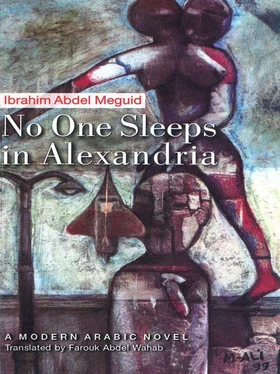The latter raised his head from the notebook, stopped writing, and said, “The English are always planning something, Usta Bayya.”
“The English have defeated Graziani and now feel secure,” Hamza blurted out. “What they’re planning now is not to leave Egypt. I hoped Graziani would defeat them, but the idiot let me down, may there be a curse on his house!”
Al-Bayya looked askance at him and said, “So, you prefer Italy to England, Tumbler?”
Dimyan and the other workers laughed at ‘Tumbler,’ which al-Bayya was the only one to use, but which fit Hamza. Magd al-Din, who had taken out his Quran and was reading silently, smiled and noticed annoyance and anger in al-Bayya’s eyes, which were very strange, as they looked at you and past you at the same time. The fact that they were blue helped strengthen that feeling.
“Why don’t you answer? Talk to me,” persisted al-Bayya.
The dark outside was compounded by a dust storm, even as the rain kept pouring down. Pebbles and flying sand were now audibly hitting the sides of the caboose. Magd al-Din hurried to close the windows, but the wind carried the dust through the open doors.
“I knew from the first that this was a black and dusty day,” coughed Hamza.
Everyone, including al-Bayya laughed. Magd al-Din, no longer able to read, put the Quran back in his pocket. He remembered Zahra, whose time was approaching. Will God give him a son this time? He decided that she would give birth in the village even if he did not go with her. He could not bear to be separated from her now, but he would be able to bear it when the time drew nearer.
Everyone fell silent, and eventually al-Bayya said, “I was hoping Graziani would win, too, Hamza. I hate Churchill.”
They had forgotten the conversation that had taken place earlier, and now al-Bayya brought them back to it.
“I hate him, too, Churchill,” Hamza said cheerfully, no longer afraid of al-Bayya. “I know that you met him, Usta, when he visited Egypt in ’36. I met him, too, but I didn’t like what he had to say. He’s full of hot air. He fooled Nahhas Pasha and made him sign a meaningless treaty.”
An ominous silence descended upon everyone, for what Hamza was saying was total rubbish, but they were surprised to hear al-Bayya say, “You’re right, Tumbler.”
Dimyan could not hold back his laughter, and everyone joined in except Usta Ghibriyal, who smiled to himself, as did Magd al-Din.
“Do you remember, Usta Bayya,” Hamza went on, “what the poet Bayram al-Tunsi said about Churchill and Nahhas in ’36? ‘If Chamberlain’s a greedy man who wants to pull a fast one on Tharwat, he’ll be lost. Let His Excellency know that we’ll make trouble — we’ve got nothing else to do.’“
Everyone looked around in disbelief, wanting to laugh but unable to. Exasperated and barely suppressing his laughter, Dimyan burst out, “What Chamberlain and what Tharwat balderdash, man? That was way back when we were kids. What does Chamberlain have to do with Churchill or Tharwat with Nahhas?”
Hamza did not reply, did not even bother to look at him, but rather looked at al-Bayya with humility in his eyes. Everyone waited for al-Bayya’s response. He calmly said, “Everything you say is right, Tumbler. Those were the days.”
Nothing was heard after that except the thunder and the downpour, which continued until the evening. The rain stopped then, as if to give them an opportunity to go home. They came out of the cars like little chicks shivering with cold. They decided to leave everything in place until the morning, but two long trains filled with white, black, and Indian soldiers appeared, moving slowly one after the other. As usual the workers lined up on both sides, and the usual voices were heard: “Welcome Johnny,” “Welcome Indian,” “English good,” “Germany no good.” The laughter of the soldiers could be heard through the open windows and doors. That night the soldiers threw the workers many cans of tuna, corned beef, cheese, and cartons of chocolate, tea, and cookies. The workers were now running back and forth alongside the trains. Magd al-Din was content with what the soldiers threw to him, so he did not run. Neither did Dimyan, who was watching Hamza, whose short stature made him look comical as he approached the steps of the train cars and raised his arm to the soldier standing there, but not quite being able to reach to get the goodies, which forced the soldier to go down one step. Hamza took what he was given, then put it on the ground and quickly moved to follow another car and another soldier. Hamza knew that no one would touch anyone else’s loot and that, had it not been for the dark, they would have divvied it all up equally. Hamza was energetic that evening. Dimyan saw him reach out his hand to an African soldier who suddenly let go of the cookie carton and grabbed Hamza’s hand, and in one quick move lifted him on the steps of the car, then pushed him inside. Dimyan shouted, “Hamza,” but no one heard him. The trains passed, and the workers began to gather their loot, but Hamza’s remained on the ground. “I saw the African soldiers carry Hamza into the car,” Dimyan shouted. The workers laughed and al-Bayya said, “Hamza is an acrobat — he’ll defi-nitely get off the train near the house. Gather his things and take them to his house.” But Dimyan, who had moved closer to Magd al-Din, sensed something else, which Magd al-Din also understood but did not want to believe.
The hearts of the lovers have eyes that see
what others cannot.
al-Hallaj
It was Mahmudiya Canal that created Alexandria in the modern era. Muhammad Ali Pasha issued his sublime decree to dig it in the year 1819 and ordered the governors of the various provinces to round up peasants to work on it. The governors would tie them up with rope and bring them by ship. Many died of exhaustion and hunger. Those who died were buried where they fell, dirt was piled over them, and the rest were marched on. Many of those buried were still alive, only exhausted, and the governors ordered them buried. So the earth claimed bodies whose souls had departed, and bodies with souls still clinging to them. The dead and buried numbered about ten thousand every year. The digging of the canal took twenty-one years, bringing the number of the dead to more than two hundred thousand. The number of those digging was never less than four hundred thousand. The boats sailed or steamed into the canal on top of two hundred thousand life stories, maybe more. Those stories made their way to Alexandria, where the canal emptied into the harbor. Did any nation need more than two hundred thousand dead to acquire a history of myths, ghosts, madness, and demons? Alexandria flourished, thanks to transportation between the harbor, the Delta, and Upper Egypt. The population rose to sixty thousand. The city continued to flourish, the population to increase, and Mahmudiya continued to be a repository of secrets.
During the day, Mahmudiya is a waterway for ships, commodities, and work opportunities. In the late afternoon, it is a river for excursions and fun in feluccas and row boats. At night, it is a place for thieves and smugglers, who raid the ships and steal what they can carry, and a place for police raids against them, a place where gunshots ring out night after night. Now thievery had increased because of the blackout all over the country. Mahmudiya is also the resting place of corpses, of those killed rightly or wrongly, coming in closed sacks from the countryside, never making it to the harbor, but always getting stuck as they hit the concrete piles under the bridges. Usually no one sees them until midday or late afternoon, as people are more preoccupied with work in the morning. In the afternoon, recreational activity in the water increases, as docs the traffic of little rowboats. Thus not a month goes by without a corpse turning up, but it is rare for three in a row to turn up, as had happened in recent days. The corpses were always women and girls.
Читать дальше












